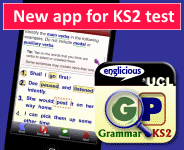Glossary
The Englicious Glossary includes the new National Curriculum glossary terms, which are shown against a white background. However, there's much more to be found here:
- we have added many entries that we feel are important, but cannot be found in the NC Glossary (e.g. connective), and
- in many cases we have added information to the (often very brief) NC entries that need further explanation (e.g. clause and phrase).
Please note that in line with our practice throughout the site, we use capital letters for function terms such as Subject, Direct Object, Indirect Object, Modifier, etc. Although this convention is not followed in the documentation published by the Department for Education we have also done so in the text that forms part of the National Curriculum Glossary.
Tip: Within our units and resources, Glossary items appear highlighted within the text. When you hover over them, or click on them in the Slideshow, a popup is generated.
yes-no interrogative
A term used by linguists to refer to an interrogative clause that elicits either a ‘Yes’ or ‘No’ response. For example, Are you cold?, Would you like something to drink? See also yes-no question.
yes-no question
A term used in pragmatics that refers to an utterance that can be interpreted as eliciting a ‘Yes’ or ‘No’ response. Typically, such an utterance would grammatically be a yes-no interrogative, but it need not be, as in the following example: She never went to San Francisco? Grammatically this is a declarative clause, but pragmatically it has the force of a yes-no question.

